IAHS News
INTERNATIONAL HYDROMETRY WORKSHOP
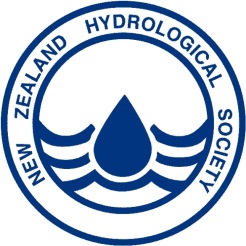
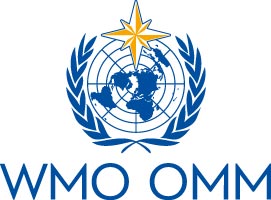
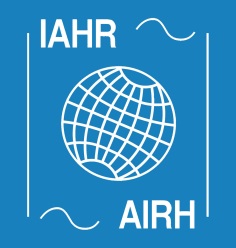
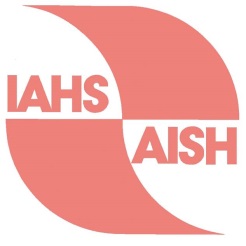
NZHS/WMO/IAHR/IAHS
are pleased to present
INTERNATIONAL HYDROMETRY WORKSHOP
RECENT ADVANCES IN TECHNOLOGY AND UNCERTAINTY ANALYSIS
The WMO/IAHR/IAHS International Hydrometry Workshop on recent advances in technology and uncertainty analysis will be held in Queenstown, New Zealand on Monday 28 November 2016 as a workshop of the 56th New Zealand Hydrological Society & 37th Australian Hydrology and Water Resources Symposium joint conference. Lecturers from New Zealand, Japan, Korea, and France will present and discuss on recent advances in stream gauging techniques, air-borne measurements and uncertainty computations.
WHERE: Copthorne Hotel, Queenstown, NEW ZEALAND
WHEN: MONDAY, NOVEMBER 28, 2016 9:00 am - 5:00 pm
COST: $50
REGISTRATIONS: http://nzhs2016.cloudaccess.host/programme/workshops.html
International Hydrology Prize – Call for nominations before 31st December 2016
The International Hydrology Prize is awarded annually by IAHS, with UNESCO and WMO, to two people who have made an outstanding contribution to hydrological science. More information, including previous awards, is available at http://iahs.info/About-IAHS/Competition--Events/International-Hydrology-Prize.do.
Nominations for the Prize are made by National Committees to IAHS, National Committees to the UNESCO-IHP or National Hydrological Advisors to the WMO, and forwarded to the Secretary General of IAHS for consideration by the Nomination Committee. The Committee consists of the President and a Vice-President of IAHS and representatives of UNESCO and WMO.
Two medals are awarded under the International Hydrology Prize: the Dooge medal and the Volker medal. Both medals are intended to distinguish outstanding achievements by hydrological scientists but with a different focus. The Dooge medal is aimed at fundamental contributions to the science of hydrology, whereas the Volker medal is aimed at outstanding applications of hydrological science for the benefit of society at large.
The following applies to both the Dooge and Volker medals
- - The International Hydrology Prize shall be awarded to persons who have made outstanding contributions to hydrology such as confers on the candidate universal recognition of his or her international stature.
- - The contribution should have an identifiable international dimension extending beyond both the country of normal work and the specific field of interest of the candidate.
- - The medals may be awarded to hydrologists of long international standing or to younger but active hydrologists who exhibit qualities of international leadership in the science or practice of hydrology.
- - An active involvement in the work of IAHS and other international organizations in the field of hydrology should be counted as an advantage.
Specific considerations for the Dooge medal
- - The Dooge medal is particularly intended for hydrologists who have demonstrated scientific excellence, and have made fundamental contributions to the science of hydrology as evidenced by publications in the international scientific literature and other evidence of high standard.
- - Preference should be given to candidates who have recently exhibited outstanding international leadership in the science of hydrology.
Specific considerations for the Volker medal
- - The Volker medal is dedicated for hydrologists who have applied their research and hydrological expertise to the benefit of society, addressing issues of public interest and development.
- - Applications of hydrology to the benefit of developing countries would count as an advantage.
- - Preference should be given to candidates who have contributed through both scientific and practical work, and who have made outstanding contributions to the Hydrology community as demonstrated by active involvement in the work of IAHS or other international hydrological associations.
Nomination format and procedure
Nominations should be received by the Secretary General of IAHS no later than 31 December 2016 – Christophe Cudennec at [email protected] – and consist of:
- - a (max. 2, pages A4 format) nomination letter signed by a National Representative to IAHS, the President of a national committee of UNESCO-IHP, or a National Hydrological Advisor to the WMO, with one sentence citation (max. 200 characters), and stating why the nominee is the most qualified person to receive the Volker or Dooge medal, paying attention to the medal's dedication specified above;
- - the nominee’s CV (max. 3 pages, A4 format) with an emphasis on the contribution to hydrological science and international scientific cooperation, providing clear information on the main criteria used for the evaluation and the specific considerations mentioned above.
- - a list of the major scientific publications (max. 2 pages, A4 format).
Nominations are expected from the world diversity, and equally for female and male candidates.
Evaluation criteria
a) Outstanding contributions to hydrology evidenced by universal recognition of his or her international stature.
b) Identifiable contributions with international dimensions extending beyond both the country of normal work and the specific field of interest of the candidate.
c) For senior candidates prove of Hydrologists activities of long international standing, or for younger candidates, prove of being active hydrologists with qualities of international leadership in the science or practice of hydrology.
d) Active involvement in the work of IAHS and other international organizations in the field of hydrology is counted as an advantage.
e) Application of the hydrological research performed and the use of his/her expertise to the benefit of society and addressing issues of public interest and development.
f) Applications of hydrology to the benefit of developing countries counts as an advantage.
World Water Development Report 2018 Nature-based solutions for water
In August 2012 UN-Water approved a new periodicity and structure for future World Water Development Reports (WWDR). The WWDR is now an annual thematic report with a focus on a different strategic water issues each year, produced by the UN World Water Assessment Programme (WWAP) in collaboration with UN-Water members and partners and possible other contributors. At the UN-Water SPM meeting in August 2014, it was decided that the 2018 World Water Development Report would be on the theme of Nature based solutions for water.
WWAP prepared a background document describing the theme and its scope and a draft ‘storyline’ as well as a list of potential ‘main messages’ for the report. These were discussed at a workshop on 13-14 September 2016 at the WWAP’s offices near Perugia in Italy attended by some 40 participants from key organisations including FAO, UNDP, INWEH, UNIDO, IISA, IHE, IWMI, UNW, WaterLEX, Ramsar and UNESCO. IAHS was represented by Professor Mike Acreman (Centre for Ecology & Hydrology), who is co-Editor of Hydrological Sciences Journal and Secretary IAHS Ltd. He suggested that IAHS could provide technical advice our understanding of hydrological processes that underpin nature-based solutions for water (including floods and droughts, improving water quality, managing sediments, conserving river ecosystems); this was welcomed by WWAP. He also proposed the use of natural capital as concept to help explain nature-based solutions to politicians and business leaders. All participants recognized that future stage of report development would need wider input particularly from water and environmental management practitioners from around the world.



2 days left early bird registration - STAHY 2016
Dear colleagues and friends,
We send this email as a reminder to register for the STAHY 2016 Workshop that will be held on September 26-27, 2016 in Quebec (Canada).
To register, please visit http://stahy2016.ca/inscription/
Please remember that the deadline for the early bird registration is on Friday, August 26.
We are looking forward to meeting you in Quebec!
The STAHY 2016 Organizing Committee
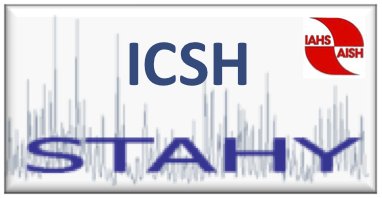
Call for abstracts for AGU session "Hydrology, society and environmental change: Coupled human-water dynamics across scales"
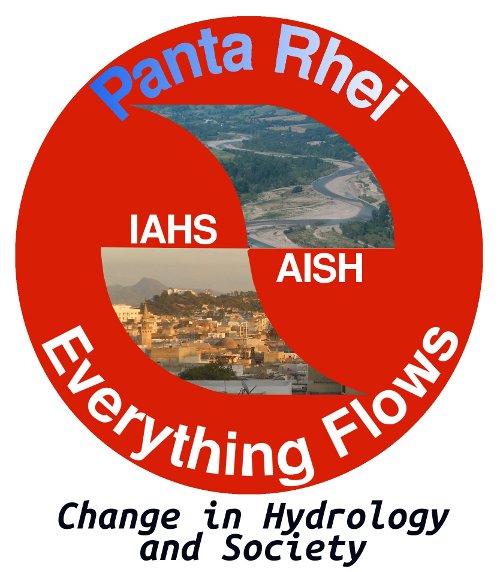
Dear Panta Rhei scientists,
The deadline for AGU abstracts is fast approaching on 3 August. Together with my co-conveners Siva Sivapalan, Taikan Oki and Alfonso Mejia, I am organizing a session on "Hydrology, society and environmental change: Coupled human-water dynamics across scales". Please see the details below. This session is supported by Panta Rhei and AGU-JpGU joint sessions on socio-hydrology. Our invited speakers are confirmed as Sally Thompson (UC Berkeley) and Nandita Basu (U. Waterloo).
Please consider submitting your research to this Panta Rhei session, we are looking forward to exciting presentations and lively debate.
Kind regards, and hope to see many of you in San Francisco,
Hilary McMillan
Hydrology, society and environmental change: Coupled human-water dynamics across scales
Session ID#: 14127
This session welcomes abstracts that consider how to observe, understand, model, and manage the effects of human and environmental changes on hydrological systems. The interactions of coupled human-water processes across multiple time and spatial scales can give rise to the emergence of complex dynamics, including critical transitions, and will pose major challenges for sustainable water management. This session is organised as part of the IAHS Panta Rhei hydrological decade 2013-2022 and is a part of the series of AGU-JpGU joint sessions on socio-hydrology. Examples of relevant areas include:
- Hydrological models that include anthropogenic effects
- Measurements of human impacts on hydrological processes
- Interactions of communities with local water resources
- Creation of databases describing hydrology in human-impacted systems
- Data analysis and comparisons of hydrological systems around the globe and especially in developing and emerging countries
- Human interactions with hydrological extremes (floods and droughts) and water scarcity
Primary Convener: Hilary K McMillan, San Diego State University, San Diego, USA
Conveners: Taikan Oki, University of Tokyo, Bunkyo-ku, Japan, Murugesu Sivapalan, University of Illinois at Urbana Champaign, Urbana, IL, United States and Alfonso Mejia, Pennsylvania State University Main Campus, University Park, PA, United States
World's Large Rivers - New Delhi 2017
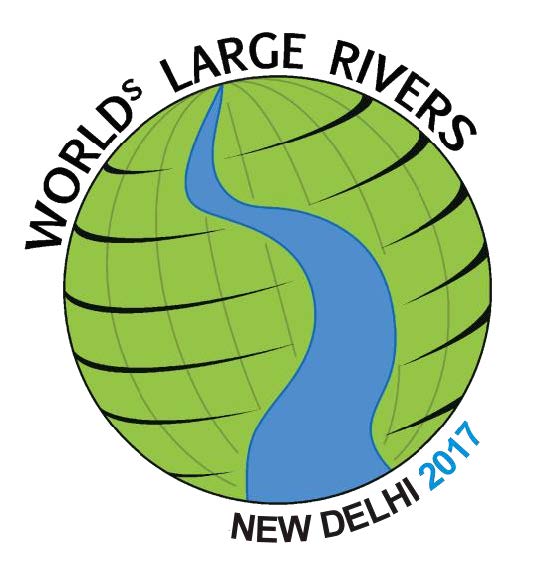
Status and Future of the World’s Large Rivers
18-21 April 2017 New Delhi, India
In 2014 a new UNESCO / IHP Programme (WLRI - World’s Large Rivers Initiative) has been called to life which aims in fostering a global network of programmes and partners related to the work and research at large rivers.
One of the main tasks of this Initiative is to continue the successful series of World’s Large Rivers Conferences. India, New Delhi will be the next venue for the World’s Large Rivers Conference. The themes are as follows:
TOPIC 1 Hydrology, Hydraulics & Water Quality
TOPIC 2 Sediment Transport & River Morphology
TOPIC 3 Ecology & Restoration
TOPIC 4 Integrated River Management
TOPIC 5 Indian Rivers
ABSTRACTS
June 2016 Call for abstracts
31 August 2016 Deadline for online abstract submission
15 October 2016 Notification of abstract acceptance
REGISTRATION
30 November 2016 End of early registration
15 April 2017 End of online registration
18 April 2017 Conference opening
Website: http://worldslargerivers.boku.ac.at/wlr/
![]()
![]()
![]()
![]()
![]()
Prof. Des Walling retires from Chair of IAHS Ltd. Board
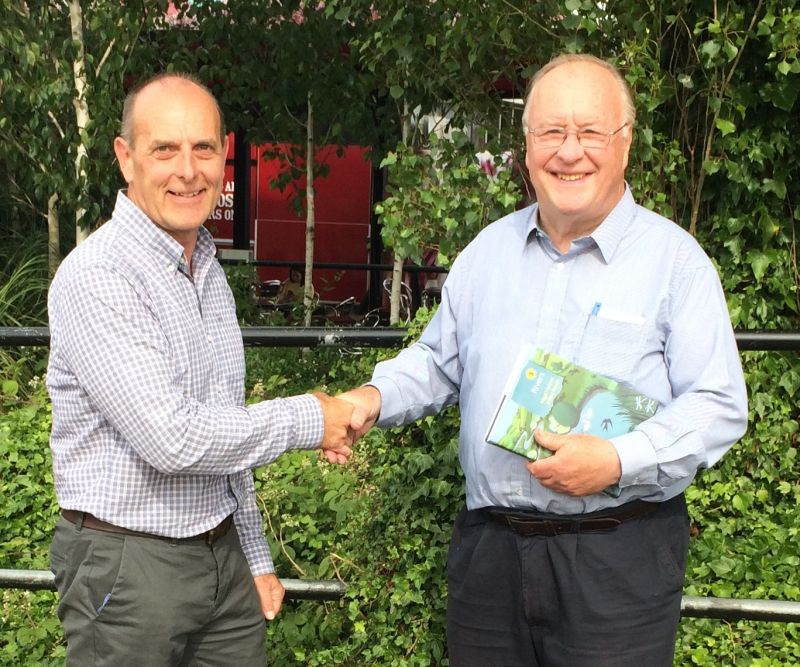
Prof. Des Walling retired in February 2016 as chair of the Board of IAHS Ltd. IAHS President Hubert Savenije and Secretary-General Christophe Cudennec thanked Des for his outstanding contribution to IAHS over more than 20 years. Des remains Emeritus Professor of Geography at the University of Exeter from where he received his PhD. Des has had a highly distinguished career as a hydrologist, specialising in erosion and sediment yields and catchment sediment budgets. Amongst his many awards, in 2007 he was the recipient of the International Hydrology Prize awarded jointly by IAHS, UNESCO and WMO. He is a past President of the IAHS International Commission on Continental Erosion (ICCE). Des has authored more than 460 scientific papers, including many in HSJ, and edited 30 books amongst which are several Red Books dating back to 1982. Mike Acreman, secretary to IAHS and co-Editor HSJ, presented Des with a book on British rivers and a card to mark the occasion.
The 8th EGU Leonardo Conference
“From Evaporation to Precipitation: the atmospheric moisture transport”
October 25-27, 2016 Ourense, Spain
2016 Tison Award Ceremony
The 2016 Tison Award was presented to Guillaume Thirel, Jean-Nicolas Audouy, Lionel Berthet, Carina Furusho, Anna Kuentz, Julien Lerat, Thibault Mathevet, & Denis Ruelland.
For the paper:
G. Thirel, V. Andréassian, C. Perrin, J.-N. Audouy, L. Berthet, P. Edwards, N. Folton, C. Furusho, A. Kuentz, J. Lerat, G. Lindström, E. Martin, T. Mathevet, R. Merz, J. Parajka, D. Ruelland & J. Vaze (2015) Hydrology under change: an evaluation protocol to investigate how hydrological models deal with changing catchments, Hydrological Sciences Journal, 60:7-8, 1184-1199, DOI:10.1080/02626667.2014.967248
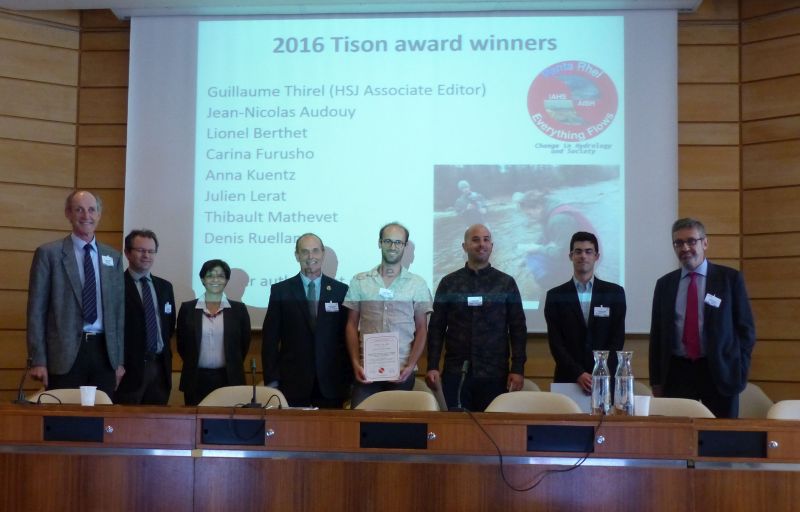
Left to Right: Hubert Savenije (President, IAHS), Christophe Cudennec (Secretary General, IAHS), Blanca Jiménez-Cisneros (UNESCO), Mike Acreman (Co-editor HSJ), Guillaume Thirel (Irstea, Tison Award Recipient), Thibault Mathevet (EDF-DTG, Tison Award Recipient), Lionel Berthet (DREAL Centre-Val de Loire, Tison Award Recipient), Tommaso Abrate (WMO).
The paper is available open access: http://www.tandfonline.com/doi/abs/10.1080/02626667.2014.967248
The IAHS Tison Award, established in 1982, aims to promote excellence in research by young hydrologists. The Award is granted for an outstanding paper published by IAHS in a period of two years previous to the deadline for nominations.
http://iahs.info/About-IAHS/Competition--Events/Tison-Award.do
2016 International Hydrology Prize medalists
Congratulations to the recipients of the International Hydrology Prize (Dooge medal and Volker medal) for 2016!
THE 2016 INTERNATIONAL HYDROLOGY PRIZE MEDALISTS
Dooge medal: Jeffrey McDonnell (Canada)
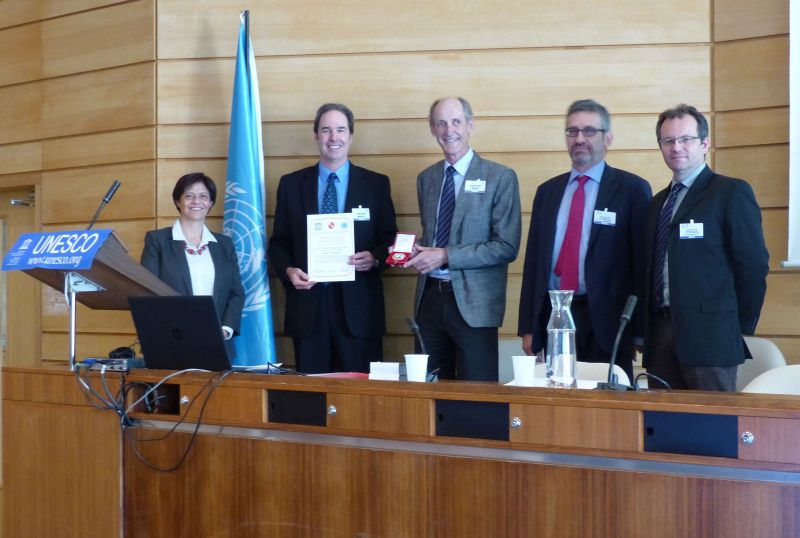
Left to Right: Blanca Jiménez-Cisneros (UNESCO), Jeffrey McDonnell (Dooge Medal Recipient), Hubert Savenije (President, IAHS), Tommaso Abrate (WMO), Christophe Cudennec (Secretary General, IAHS).
Volker medal: Denis Hughes (South Africa)
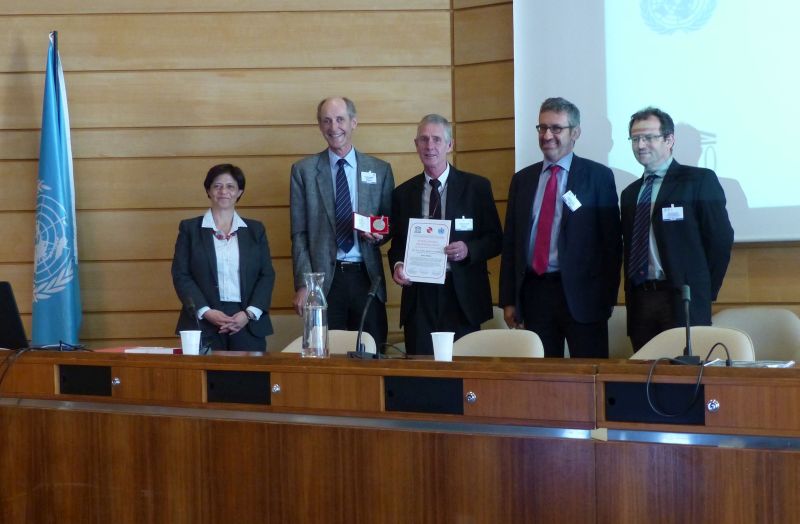
Left to Right: Blanca Jiménez-Cisneros (UNESCO), Denis Hughes (Volker Medal Recipient), Hubert Savenije (President, IAHS), Tommaso Abrate (WMO), Christophe Cudennec (Secretary General, IAHS).
Awarded during the 12th Kovacs meeting at UNESCO in Paris, France (15th June 2016).
The International Hydrology Prize is awarded annually by IAHS, with UNESCO and WMO, to two people who have made an outstanding contribution to hydrological science.
Nominations for the Prize are made by National Committees to IAHS, National Committees to the UNESCO-IHP or National Hydrological Advisors to the WMO, and forwarded to the Secretary General of IAHS for consideration by the Nomination Committee. The Committee consists of the President and a Vice-President of IAHS and representatives of UNESCO and WMO.
Two medals are awarded under the International Hydrology Prize: the Dooge medal and the Volker medal. Both medals are intended to distinguish outstanding achievements by hydrological scientists but with a different focus. The Dooge medal is aimed at fundamental contributions to the science of hydrology, whereas the Volker medal is aimed at outstanding applications of hydrological science for the benefit of society at large.
http://iahs.info/About-IAHS/Competition--Events/International-Hydrology-Prize.do
